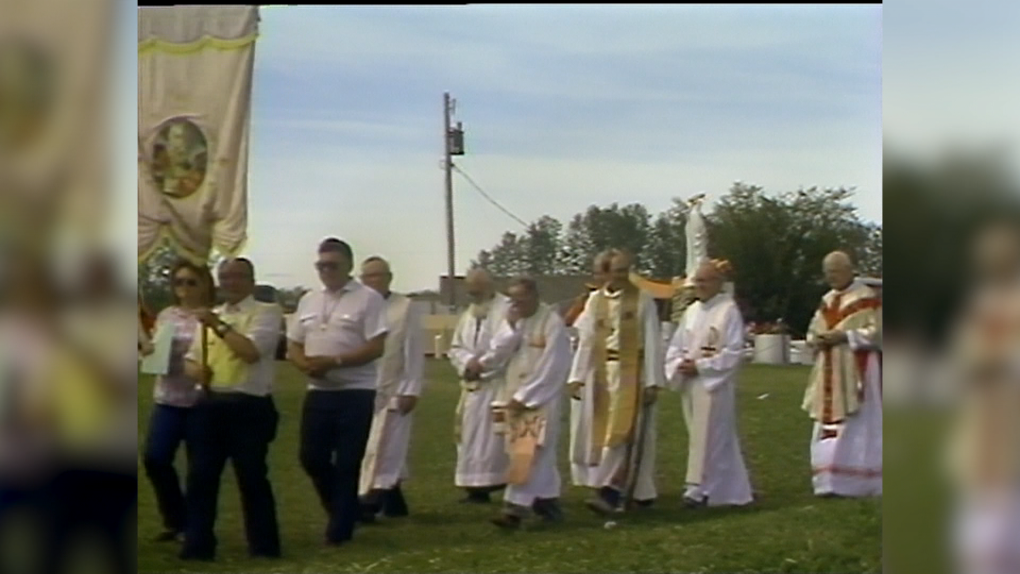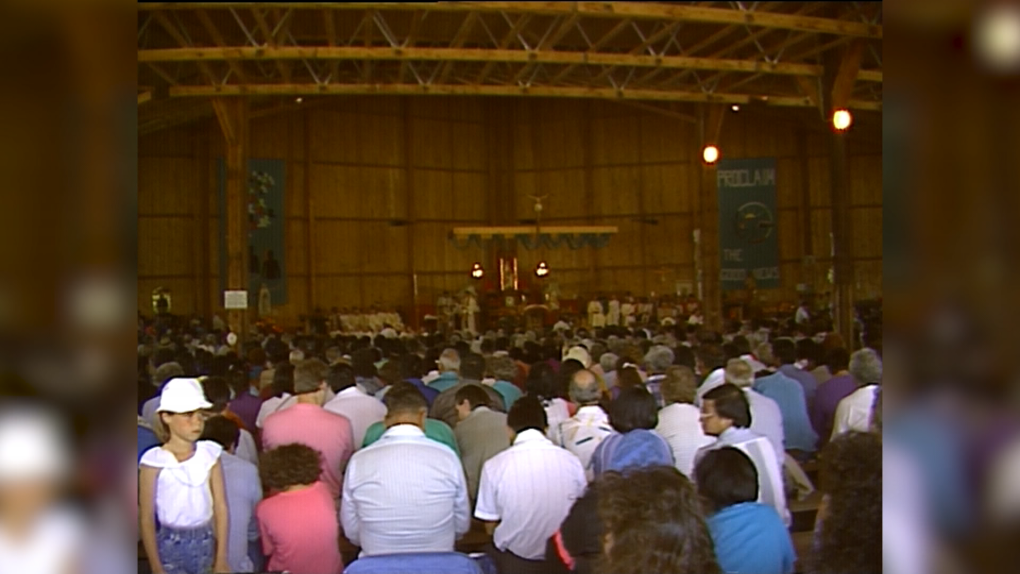'Every step forward matters': Indigenous leaders, Albertans ready for historic Papal apology
With Pope Francis officially in Edmonton after the 8,200-kilometre journey from the Vatican, the historic trip is expected to bring a meaningful message and an apology on Canadian soil.
The head of the Roman Catholic Church landed at the Edmonton International Airport Sunday morning after a 10-hour flight and was greeted by the Governor General, the Prime Minister, and Indigenous leaders.
The sounds of a drumming circle welcomed the pontiff ahead of what he described as a "penitential" visit that has been in the making for decades.
'IT'S A JOURNEY'
"It's a long time coming for the people who suffered in the schools," said Alma Desharlais, a residential school survivor from Frog Lake First Nation. "I am glad to live the day that I have seen it and meet the Pope."
The Catholic Church administered more than 60 per cent of the residential schools in Canada.
On Monday, it is expected Pope Francis will reiterate an apology for the Church's role and intergenerational trauma inflicted within the residential schools system at the community of Maskwacis, the site of the former Ermineskin Indian Residential School.
Chief Calvin Bruneau of the Papaschase First Nation will be among the first Indigenous leaders to greet him at Sacred Heart Church on Monday evening.
Bruneau's grandmother was abused at a residential school, and he hopes the Papal apology will recognize both the "pain" inflicted but also future "aspirations" of Indigenous Peoples.
"Reconciliation is not a grand act, declaration, or gesture," Bruneau said in a statement. "It's a journey. Every step forward matters."
Papaschase First Nation, which signed an adhesion to Treaty 6 in 1877, remains unrecognized by the federal government as a band and rights-holding Indigenous nation.
"As Chief of a Nation whose ancestors and descendants have been scarred beyond what words can describe by colonial injustices and the horrors of residential schools, I am hopeful that the Pope's visit will include a meaningful apology," he added.
Archbishop Richard Smith, representing the Archdiocese of Edmonton and serving as the Papal visit's general coordinator, is confident that the visit will go well.
"It has been a challenge (to organize), but we've brought together an extraordinary national team," Smith said on Saturday.
"What I have seen through all of that across the board is people who are seized with the historic import of this particular moment," he added. "We have a sense across our country, I believe, that this will be a very important moment."
Calls to recognize the trauma of Canada's colonial past by the Roman Catholic Church date back decades.
Three decades ago, thousands gathered in Lac Ste. Anne to hear what would mark the first in a series of apologies for Canada's residential school system.
 Hundreds gather at the Lac Ste. Anne pilgrimage site in the summer of 1991 to hear the Missionary Oblates of Mary Immaculate, a religious order that administered about 50 residential institutions across Canada, apologize for their role in the residential school system (File photo).
Hundreds gather at the Lac Ste. Anne pilgrimage site in the summer of 1991 to hear the Missionary Oblates of Mary Immaculate, a religious order that administered about 50 residential institutions across Canada, apologize for their role in the residential school system (File photo).
Those words came from a reverend speaking on behalf of the Missionary Oblates of Mary Immaculate, a religious order that administered about 50 residential institutions across Canada.
"The Oblates are the first ones to apologize. They do that in 1991," said Indre Cuplinskas, University of Alberta St. Joseph's College associate professor. "They are only the second Christian group to apologize. The first one to do it, is the United Church in 1986."
 Hundreds gather at the Lac Ste. Anne pilgrimage site in the summer of 1991 to hear the Missionary Oblates of Mary Immaculate, a religious order that administered about 50 residential institutions across Canada, apologize for their role in the residential school system (File photo).
Hundreds gather at the Lac Ste. Anne pilgrimage site in the summer of 1991 to hear the Missionary Oblates of Mary Immaculate, a religious order that administered about 50 residential institutions across Canada, apologize for their role in the residential school system (File photo).
APOLOGIES HAVE BEEN BUILDING UP
As the years progressed, Cuplinskas told CTV News Edmonton that the apologies moved from more groups and communities that operated at the "local level" of the colonial system to larger institutions.
"These apologies have been kind of taking place for 35 plus years," she said. "There's a buildup."
"It is taking time," Cuplinskas added. "Whether it has to take time, I don't know, but it has. It is layered, and one group pressures the other (for action)."
The first apology from the federal government came in 1998 from Canada's then minister of Indian affairs and northern development in a letter to the former Chief of the Assembly of First Nations.
It would be another decade before Indigenous Canadians would hear from the prime minister. In 2008, Stephen Harper, in a joint session of Parliament, asked for forgiveness from Aboriginal Canadians for "failing them so profoundly."
The following year, Canadian Indigenous leaders and school survivors visited Pope Benedict XVI, who expressed "sorrow" at the "anguish caused by the Canadian Residential School system."
"His Holiness emphasized that acts of abuse cannot be tolerated in society," a statement from the Holy See Press Office said at the time. "He prayed that all those affected would experience healing, and he encouraged First Nations Peoples to continue to move forward with renewed hope."
Cuplinskas said while that may have been a step on the path to reconciliation, the Truth and Reconciliation Commission, completed in 2015, called on the Pope to issue an apology to survivors and their communities on Canadian soil.
'THERE'S A HOPE'
It wasn't until last year when the uncovering of unmarked burial sites at former residential schools — known about by Indigenous communities through oral history — reinvigorated calls for a Papal visit.
In March, 30 elders, knowledge keepers, and residential school survivors went to Rome to press the pontiff for a Canadian visit.
"The fact that the Pope committed to this trip, even despite his health, just underscores this is an important thing for him," Cuplinskas said.
Francis is the first Pope selected by the Catholic Church from outside Europe since the eighth century. For Cuplinskas, that underscores another reason why this visit is central to him.
"He grew up in a country with a clear colonial past, so I think as a bishop from there, he already encountered Indigenous People in Argentina," she said. "Not just there, but he's aware of Indigenous issues in South America in a very real way that other popes from Europe just didn't."
Cuplinskas says she will be watching the visit closely to see what messages Pope Francis delivers to Indigenous People and residential school survivors.
"I'm humbled by the number of Indigenous People making long and difficult trips to see the Pope," Cuplinskas said. "I hope that whatever he says fulfills many of their expectations and does bring healing, at least to some People."
Additionally, she wants to see how other Catholics engage with the Papal visit, as part of the TRC's call to actions is to continue educating religious groups and communities about the legacies of colonialism and to actively engage in reconciliation.
"I'll be looking at how non-Indigenous Catholics engage in the hope that this visit refocuses their energies and concerns, and that they become more concerned with reconciliation," she added.
Many Indigenous People have complex feelings on the eve of the reiterating of an official apology on Canadian soil and Pope Francis' first speech in the country.
"Some First Nations Peoples are practicing Catholics," said Chief Tony Alexis, of the Alexis Nakota Sioux Nation."For them, they see this as a moment of celebration and acknowledgement. While some community members are angry and still struggling.
For Alexis, hearing the apology is important, but also what comes next.
"There's still a great deal of work ahead of us," Alexis said. "But it's a good start. There's a hope."
With files from CTV News Edmonton's Chelan Skulski
Contact the Indian Residential School Survivors Society toll-free 1 (800) 721-0066 or 24-hour Crisis Line 1 (866) 925-4419 if you require further emotional support or assistance.
CTVNews.ca Top Stories

Ford pushes for 'more proactive' border action after Trudeau meets with premiers about Trump
Ontario Premier Doug Ford is calling on the federal government to 'take a more proactive approach at the border' following a call Wednesday night between Prime Minister Justin Trudeau and all 13 premiers to discuss U.S. president-elect Donald Trump's tariff threat.
Liberals table GST holiday legislation, putting $250 rebate on backburner
Prime Minister Justin Trudeau's promised holiday consumer relief package has been split in half. After NDP Leader Jagmeet Singh said his party was only ready to help pass the GST/HST holiday portion of the affordability announcement, Deputy Prime Minister and Finance Minister Chrystia Freeland tabled legislation Wednesday that only seeks to enact that measure.
Missing hiker found alive after 50 days in northern B.C. wilderness
A missing hiker who spent 50 days alone in the frozen wilderness of northern British Columbia has been found alive.
Boeing plane makes emergency landing at Montreal's Mirabel airport after landing gear malfunction
No injuries were reported after a Boeing 737 was forced to divert to Mirabel airport after the aircraft experienced a technical issue with the landing gear.
Montreal billionaire Robert Miller could have as many as 100 victims, lawyer says
A Quebec judge is hearing arguments this week in a class-action lawsuit application against Montreal billionaire Robert Miller over allegations he paid minors for sex.
It's expensive to visit the Maldives. Now it's more expensive to leave, too
The Indian Ocean archipelago nation of the Maldives, known for its white sand beaches and coral reefs, has just increased the price it costs to leave.
Two Canadians arrested for failed murder plot in California
Two men who travelled from Canada to Monterey County have been arrested and accused of attempted murder after a triple-stabbing Sunday.
Northern lights forecast to fill the skies in Midwest U.S., some areas in Canada
The northern lights could be visible for residents in northern and upper Midwest states in the U.S. as early as Thursday, including some Canadian provinces.
Ontario to match GST holiday by removing provincial sales tax on some items
Ontario says it will match the federal government’s two-month GST holiday by removing provincial sales tax (PST) from items that are not currently covered by existing provincial rebates.

































